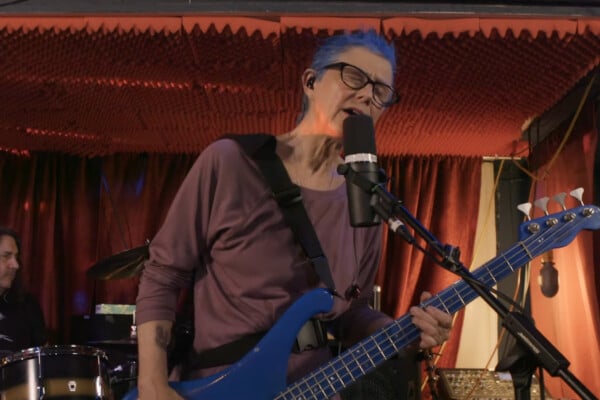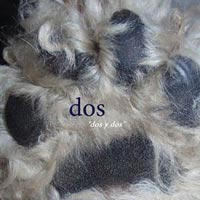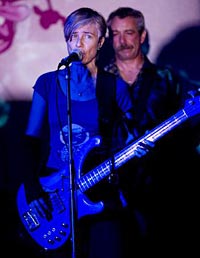Kira: An Interview with Kira Roessler

She’s a punk rock icon, a bass hero, an award-winning sound editor, and now a solo recording artist. But the biggest part of Kira Roessler’s identity comes back to being a bass player.
“Bass player first and foremost – this is just who I am,” she says. “Then a sound editor, dog mom, loving wife, and loner.”
Roessler has played with several influential punk rock bands, and most recognize her as the bassist for Black Flag. During her brief tenure from 1983 to 1985, the band released five albums in addition to their steady touring schedule. If that wasn’t enough, she was simultaneously attending UCLA to major in applied engineering, taking classes and tests in between tour legs.
After Black Flag, she teamed up with Minutemen bassist Mike Watt (to who she was married from 1987 to 1994) to form the bass duo Dos. Their unique tangle of low frequencies has been an enduring and inspiring sound for bassists, especially.
Roessler’s “day gig” is as a dialogue editor for films. She’s pieced the speech together for Confessions of a Dangerous Mind, The Twilight Saga: New Moon, and Under the Tuscan Sun. More recently, she was on the sound editing team that won an Oscar for Mad Max: Fury Road.
 With all that under her belt, she released her first solo album, Kira, late last year. The music is deeply personal, even heavy at times. Her sparse sensibilities and twisting bass lines draw you into her emotions over the 10 songs. Roessler admits the record came by surprise after her brother Paul offered to produce it.
With all that under her belt, she released her first solo album, Kira, late last year. The music is deeply personal, even heavy at times. Her sparse sensibilities and twisting bass lines draw you into her emotions over the 10 songs. Roessler admits the record came by surprise after her brother Paul offered to produce it.
We caught up with Roessler to get the scoop on all that and more, including how the bass is her lens to the world.
Kira is available now digitally via iTunes and Amazon MP3.
I know you’ve said you’re a bass player through and through. What brought this solo album about now?
 I’m a bass player, but what I mean when I say that isn’t necessarily that I play all the time. It’s that it’s my identity. I mean, I’ve been playing bass longer than I’ve been a woman, you know? So if you think about it that way, it’s like an extension of myself. And so when I have feelings to express or situations to process or whatever, the bass is how I communicate. It’s how I express it. It’s how I get through difficulties or joys. For me, it is the mechanism by which I process life.
I’m a bass player, but what I mean when I say that isn’t necessarily that I play all the time. It’s that it’s my identity. I mean, I’ve been playing bass longer than I’ve been a woman, you know? So if you think about it that way, it’s like an extension of myself. And so when I have feelings to express or situations to process or whatever, the bass is how I communicate. It’s how I express it. It’s how I get through difficulties or joys. For me, it is the mechanism by which I process life.
My process just is one where I spend time in the room writing, and I may have at any given time 20 songs going that are in various stages of completion. I keep sort of a list and then at any time when I sit down, I might grab one of those and push it a little further. This has been going on for many years. The intention isn’t necessarily to generate published work in a way; it is to, like I said, process my life.
Once I have a couple of bass lines and some singing or whatever, I send it to my collaborators who I’ve been working with virtually for many years. [The] guitar player in Ohio who does some beautiful work, Glen Brown, is on the record as well as a local drummer, Dave Bach, but we don’t work together on these songs. I send them to him and he works at his convenience. Most of the time my work happens at 6:30 in the morning. Who wants to do that with me? [laughs]
After the pieces start to fall into place, I usually do go to Kitten Robot Studio where my brother, Paul and I finish the songs and maybe add little elements, or sort of mix and polish. Then, quite to my surprise, he said, “Kitten Robot wants to put out a solo record.”
This set of songs is actually sort of a chronological story that starts 13 years ago, and the last song is very much current. It felt like I had finally gotten to a place with it, so when he said that, for whatever reason, I just felt like, “Okay, this is the time I’ll actually take that next step.” Again, that wasn’t necessarily the plan, but it seems like it’s been a really good moment to capture this particular set of songs, and people have been very kind about it. So I appreciate that.
You’ve been a part of a lot of incredible projects. Does it feel much different to release a solo album?
Well, it’s been… it feels very strange. It’s very different when you’re collaborating. Bands are rarely democracies, right? So a lot of the times when I’ve been playing I’m a contributor, but not necessarily a driving force. So some of the things that might come naturally to people, like the visual art of coming up the look for the record or a music video where you have to have a visual idea of what to do. These things to me were somewhat new and different, even though I have been doing this forever.
It felt like this thing was building and building. We released the music video and so there’s been this sort of a slow burn into this moment of release. And yeah, I gotta say it feels totally different. I feel completely naked and that makes sense because this work too is basically about exposing raw emotion. It’s a very sparse, purposefully, honest and clear sharing of some feelings that hopefully other people can connect to.
I think for most bass players, stepping out in front would feel foreign.
You know, I’ve been doing Dos for 30 years with Mike Watt, which is a little bit more like bass wars. Because it’s just two people, obviously my role is a little bit more formative. I write more of the songs and more of the lines. So that has been going on and was very much a shaping effect of my music. We decided very early to not have one bass laying the foundation and the other doing the melody. Instead, we wanted to syncopate and leave holes and find holes and come together in a very intertwined way.
And so that became sort of my mode of writing. Even though Mike’s very busy, my writing for a long time was geared somewhat to that dynamic. I sing a lot more on my own stuff than I do in Dos, but we did some singing songs and I covered some of my favorite singers.
So it doesn’t feel that unusual music-wise, it feels unusual personality-wise. I’m very much a play-alone-in-my-room person, so putting myself out there front and center feels a little strange. Although again, in Dos I did sort of become the “front person” because I was often on the mic.
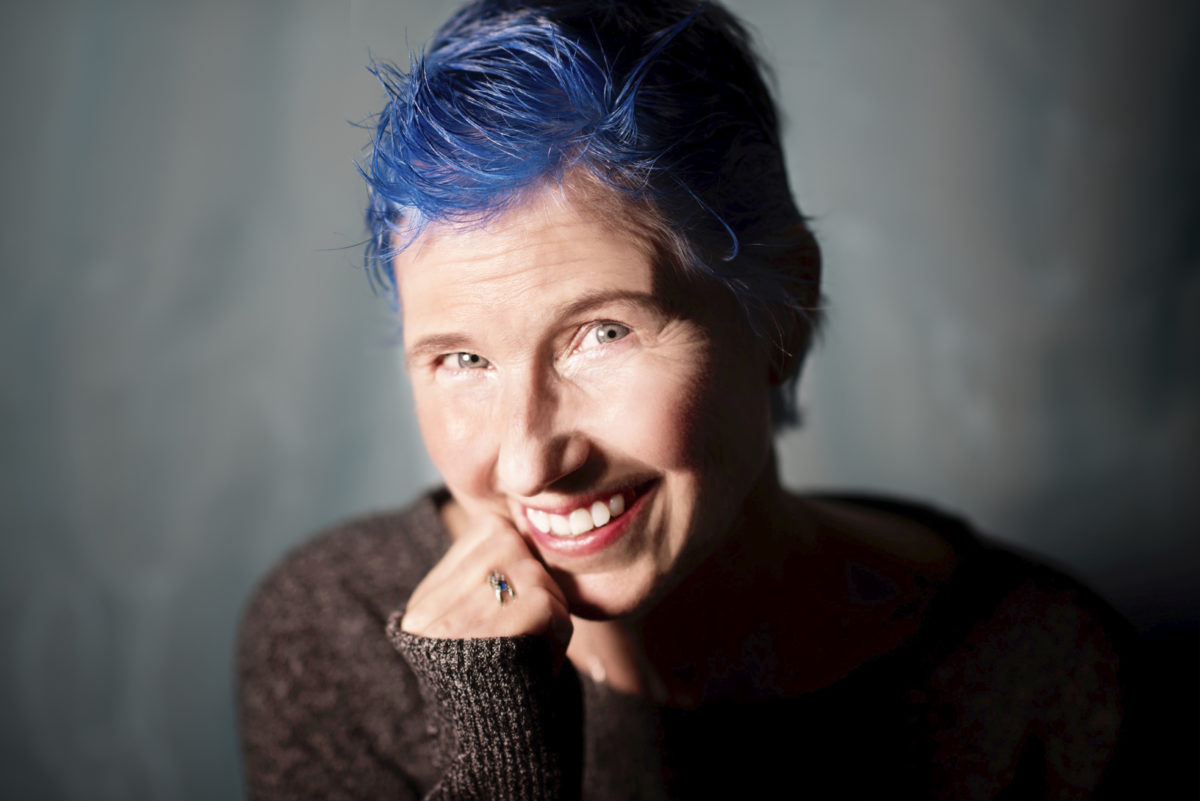
When you’re writing, do things come to you from noodling on the bass, or do you start with a melodic idea in your head?
Generally speaking, there’s a seed of an idea or a feeling, or a situation. Then again, my bass is how I process, so there is not a bass line in my head. Nine times out of ten, I just start [with a] completely blank slate and my bass is my way to get that seed to start sounding like a song and make the music express that thing that’s in my head. But it’s a concept in my head and the bass turns it into music.
I sometimes feel a song just takes on a life of its own. I have the starting point and I push it along, but where it’s going to end up, I have no idea. Much like this record – I had no idea until after the fact.
Do you have a whole treasure trove of tunes that aren’t out yet?
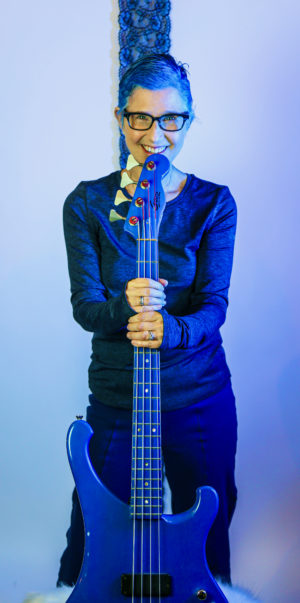 Very much. I always have about 20 songs in some stage of completion. I picked this set out because of the story they told, but there were others that could have been part of it. That’s just how I am. I’ll be making music; whether or not it gets released is a separate issue.
Very much. I always have about 20 songs in some stage of completion. I picked this set out because of the story they told, but there were others that could have been part of it. That’s just how I am. I’ll be making music; whether or not it gets released is a separate issue.
Music for me obviously is pretty personal, so it’s going to happen. If I don’t play my bass for some days, I will have this unconscious, low-grade depression start and I won’t know it. Then I’ll realize [I haven’t played bass] and I’ll say, “Of course!”
It just is something that has to happen, and it creates this balance in my life. Everything is not quite right unless it’s all happening, and so it will continue to happen.
What’s your working relationship like with your brother?
Paul has been my big brother since the day I was born so that’s always part of the dynamic. When we were quite young, we both played piano and I quit because I was frustrated because I couldn’t keep up because he’s my older brother and he was better.
I finally figured out around 14 that if I played a different instrument, I might be able to play with him instead of competing with him. The early years have their troubles as siblings would. I mean, I think I was kicked out of Twisted Roots three times, which was his band, his songs, and not a democracy. And it wasn’t because of my bass playing.
Personalities can be a struggle, but as the years have progressed, Paul and I have become extremely close, partially because much of the rest of our family isn’t local here to LA and we are. Even though we don’t necessarily see each other a lot, there’s been this foundation created that our existence together is the family.
When we actually worked on my material, it took some time for Paul. His sensibility is quite different. He makes very layered, lush music and so my very sparse, very delicate music was, was a, a bit of a learning curve to work together. He still is a wonderful person to bounce it against because he’ll say, “Well, does it need this? Does it need that?” He’ll push into it and suggest that something might be missing. That makes me act as editor to say yes or no, and often it’s no because I do strip it down. It’s helpful to have that person saying, “should we add?” Because the bass for me tells the whole story, but the extra little elements do add a lot.
It has to be fleshed out song by song, very painstakingly, and he’s very good at that.
He works as a producer so he knows how to spend time helping people get music done. With me, he often will let me EQ the basses because of course I’ve been doing that my whole life, but on other things, I’ll lean on his producer’s ear. It’s become something special, but it’s taken a long time because of course he was for so long the creative force. I was in his band and I was coming in and playing bass on something that he had started or had asked me to contribute to. So in that role, I try to just do what’s right for that music and that band. Then I’m putting on my hat that says, “How can I fit in the best? How can I add to [this] without taking anything away?” That had been our way of working for a long time so it took some time to shift gears on my records.
We actually did a little EP with my band, Awkward, with Devin Hoff who plays bass and makes it also a two bass band. He watched us create this pretty elaborate, complicated music, and I think some lights started going on with Paul where he was able to see more of who I am.
Of course, he sees me as his little sister, so it took some time before I could be this interesting bass player/writer person. Many people don’t necessarily see bass as a foundational instrument, but I’ve of course been thinking it was a foundational instrument for 35 years. Mike and I did Dos primarily because we both felt that way. We didn’t feel like we needed anything else.
It’s that rugged independence we have as bass players.
That’s right. It’s also that non-conformist, very punk rock attitude.
Changing subjects a bit, your other audio work includes sound editing for films, for which you’ve won an Emmy. What all does that entail?
People always wonder what does that mean? Don’t they just record it on the set?
They do record it on the set and it has all these inherent problems. Then they chop it up into little pieces because when they create the scene, they have all these different angles and stuff. When I get it, it sounds like a bunch of little chopped up sentences, so my job is to basically translate that into something that sounds like it all happened seamlessly as a scene, even though it was not recorded that way.
That involves smoothing out the background sounds to make them not come smashing in, but rather maybe slowly bringing them in and out. That’s a whole process. Then any problems that I can resolve like ticks clicks, or bumps [get taken care of].
It’s very editorial. It’s not my job to EQ it; that that is handed off to the mixer. I’m preparing and arranging the material in such a way that it’s easy for him to work and I’m solving as many problems as I can solve until the time runs out.
It’s kind of like a puzzle. It’s not particularly creative. There’s a set of problems to solve and I just have to see what I can do to make the next guy’s job easier.
I was wondering if it was more creative and if that would have an effect on the way you’re listening and working on your own album.
I would say less creative, but being that I have this editor mindset, I think that does affect me in terms of the editing of the layers of the songs and, of course, how I record. In the old days, you couldn’t fix the bass line editorially, you’d just have to punch in since it was on tape. I now can use those skills to potentially solve problems, just like I can in the dialogue. But the writing process is its own beast.
Let’s get geeky for a second. What are you using to record?
I use Pro Tools, and that started basically when I began to do sound editing for a living. Pro Tools happens to be pretty much the industry standard in television and movies. Before that, I had a four-track cassette deck and stuff like that, so I’ve always had something to record on.
When I started working in Pro Tools, I got a cheap little analog/digital translator device that works with Pro Tools so that I could record into that software. Since I was learning and working in that software anyway, it just made sense.
Ever since then, I can I sit here at my desk and I can work or record bass, right here in my little sphere.
Are you still rocking the same Garz bass?
Yes, for the last 10 or 15 years that’s been my primary bass now. I have two of them because one of them was stolen for 10 days. During the time that I was curled up into a ball over that, Mike had him start another one. So I have a blue one and a blonde one, and like guitars are, they sound different. Even though it was built with the exact same process, the blue one is the best sounding bass I’ve ever heard.
It’s plug-and-play. I barely need to do anything. The brown one has its own personality and I love it, too. They’re kind of my “old lady” basses. They’re a little smaller, a little lighter. It’s just the tool, though. Even though I say I’m a bass player, the bass itself is like a hammer. It’s just the way I do my carpentry.
I wanted to talk about a couple of tunes. The bass line for “Worse Than Rude” really stood out to me. It has such a cool slide up into a double stop. How did that one come about?
It starts with the situation and the upset that I was feeling and the bass line had to be a bit of a driving bass line because it was… This isn’t a sad song, it’s a little more of a mad song. There’s a sort of pounding kind of rhythm in my head. Like I said, I don’t know what happens, it just started coming out as this sort of repetitive, driving [line] that would be a rocking bass line if there were drums.
I have this metronome in my head and I start rocking back and forth and that’s what comes out. I can’t always explain it, but it did capture this upset that I was feeling and the lyrics came afterward.
Are you using both the basses on this album? The way your lines intertwine like on “In The Quiet” is beautiful.
No, it’s just the blue one. That writing style is pretty familiar to me. When I’m finishing up, I EQ them differently. I try to get you to listen to the sound of it and maybe one needs a little bit less warmth and a little more growl or one needs a little more warmth or whatever.
So they do get EQ’ed distinctly. The goal isn’t necessarily for them to sound exactly the same, but the lines are written in such a way that they leave spaces and holes and they intertwine a bit and then I EQ it however makes sense for that song for the two lines.
Many fans know you for your time in Black Flag. I get the impression you’re done talking about that. Is that fair to say?
Look, it’s obviously a part of my life. It’s two years out of my now 60-year life. It’s different for me than it is for others, but I have no regrets. I have no resentment about talking about it. It’s a part of what makes me who I am so I don’t mind talking about it. It’s nice that there’s something new to talk about, [laughs] but that doesn’t mean I mind talking about it.
Something that strikes me about your time in the band is just how prolific you were. You recorded all those albums with them in that short time, and that was all while you were going to school. How did you find the energy for all that? Did you sleep at all?
I was in my twenties, so that helps [laughs]. When I joined Black Flag, I knew what I was getting into. They were a touring band. They were a very intense, focused set of guys. We had the discussion right at the start: I’m going to finish school, but I will take time off to go on tour. You know, it seems like a lot of recording, but when you strip it down… Back then you were going into the studio, and we weren’t flush with money.
So the way it works to do the basic tracks is you have a 48-hour lockout of the studio. During that 48 hours, we usually would record two records, just basic tracks. You just play until you can’t play anymore and you take a little break and you play some more and you play some more.
[The actual recording] was all done in a very intense, short time period. And then after the fact, Greg and Henry would overdub their parts to it. Inevitably, when we were doing one of these lockouts, I’d have a midterm Monday morning after the weekend, so I’d have my schoolbooks and when we drop to not play anymore, I’d be studying.
That was just the commitment I had made really for myself. I [couldn’t] bring that up to them. One of the things about joining a band like that when you’re a girl is you cannot show weakness, and I’m not saying they were like that. That was me. [It was] my attitude that I can’t show weakness. I could never show that I was overwhelmed by school since that was something that I had insisted on continuing. Basically, I went to school, we practiced for five hours, I studied, we recorded sometimes, and then we toured. There just wasn’t room for anything else.
And on tour, you don’t sleep enough. Sleep was optional. At home, you get a little bit more rest because you at least have some control over your space, but it’s not like I had an apartment. You’re gone too much and you’re not making any money, so I was sleeping on people’s floors and in vans, even when I was at home.
Didn’t you feel totally overwhelmed? How did you deal with all that?
Well, yes, you feel overwhelmed, but you’re balanced by your motivation. Your motivation to prove that you can keep up with this band’s momentum and your motivation to do this applied math in school.
It just requires a certain amount of energy that you have to put in, or you might as well quit. You can’t just toggle it down, so you just consider it a given. When you’re overwhelmed, you have two choices: You let it take over or you say, “Okay, it’s a given that I have to do all this stuff. I just plug away at it in the moment and try to stay present and don’t think about the fact that there are 25 things coming down the pipe. Do the thing right in front of you.
That’s still happening to me. I’m trying to work a full-time job and I’m trying to do other things too. My dogs have to be taken care of and interviews have to be attended to. You’ve got to try to get a little exercise if you want to not sit in front of your computer all day long. It’s just a matter of growing up like we all did and saying, “I just have to do this set of 15 things today and balance them against each other and not let it get overwhelming.”
And yeah, if you think about it too much, it’s often overwhelming. Life, I think, tries to be overwhelming.
When you left the band, did you feel a sense of relief to have more time to yourself?
Well, they kicked me out. I was sad at first, and then there was sort of the conundrum of getting a place to live. I was at my final quarter at UCLA, so I had to finish that up. Then the next conundrum was I had to find a way to support myself now with this degree.
I suppose I might’ve been relieved, but the tasks at hand were still to finish school and support myself. The next life demands keep coming. It wasn’t like there was some offer on the table to join some other touring bands. I had to figure out what to do next, which took some doing.
Were you ever the kind of person who had a big set plan for your goals, or were you just rolling with the flow?
Well, it’s funny enough. I am a planner, but I’m a planner who recognizes that the plan is never going to go my way. So I’m also an opportunist when something arises that feels right, then I have to jump with both feet. If something doesn’t fall into place, then I stop trying to force it. I’m very conscious of not resisting the universe if you will.
When initially the plans don’t go my way, I have the same reaction most people have. I get frustrated. But I have been very lucky that the next sort of opportunity comes up and I’m able to shift gears and I’ve had to do it a lot. And practice, practice!
Are you getting out very much to perform these days?
I am not [and] I have not played in a few years. I miss playing live for people. That connection that obviously I’m trying to have with my music and the emotions is an incredible feeling when you’re with people and you’re actually able to express that with people.
There’s a part of me that misses that and wants to find a way maybe to make that happen. I don’t think I’ll be jumping in a van and going on tour. That probably won’t happen. But I am interested in those feelings of sharing things. It’s never something that you let go of the joy of that feeling.
Again, it’s a small part of what it takes to make a gig even happen. The amount of time that you’re actually on stage feeling those feelings is kind of small compared to all it takes to get there. And touring is like that, too. You’re maybe on stage for two hours, but the other 22 are brutal. I balance it off, but I am interested in connecting with people again.
My other question is will there be more Dos material?
You know, Dos is not broken up, it’s just that we both are extremely busy folks. Mike keeps doing what he does and has projects. His momentum is very strong and so is mine and my life.
I think this has been an interesting time for him, because like with me, it all came kind of out of left field for me to release this solo record. Mike’s been interested in and jazzed about it, so who knows? It could happen.
It’s one of those things exactly like we were talking about [where] if the circumstances align it will happen and I will jump on it. If it’s too much of a struggle and too hard to make happen, then it probably won’t.
We’ve certainly talked about recording more. As I said, I always have songs in the work and there’s certainly a set of songs I could throw into the Dos mix. There always are.

